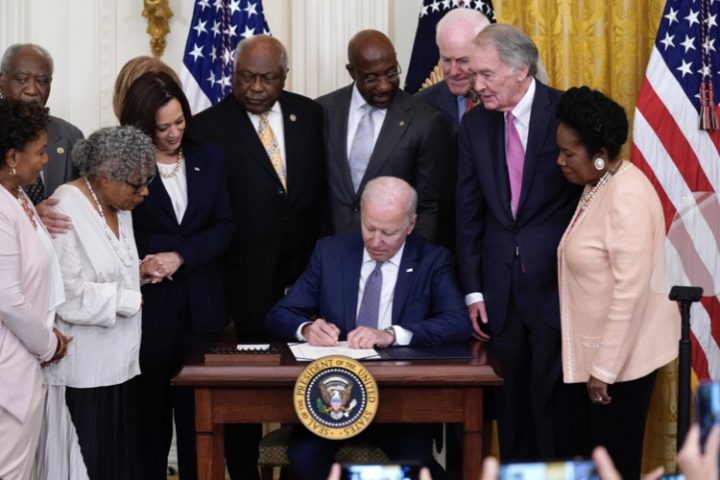
President Joe Biden signed legislation on Thursday that makes the 19th of June yet another federal holiday, with paid time off for federal workers. The new holiday — Juneteenth National Independence Day — was passed by the House of Representatives on Wednesday, with few dissenting votes, and the Senate on Thursday on a voice vote. It purports to commemorate the end of slavery in the United States.
While Biden signed the bill, it seemed that Vice President Kamala Harris — who has some black African ancestry — was the central figure in the signing ceremony. “As we establish Juneteenth as our newest national holiday, let us be clear about what happened on June 19, 1865, the day we call Juneteenth. They [slaves in Galveston, Texas] learned they were free.”
Biden added that the day was “a day in which we remember the moral stain, the terrible toll that slavery took on the country, and continues to take.” He argued that great nations “don’t ignore their most painful moments. We come to terms with the mistakes we’ve made,” and this causes healing.
Not all federal government employees have the day off — this year, at least. The U.S. Postal Service will still operate on a normal schedule, noting that it is “not possible to cease the operations of the Postal Service to accommodate an observance over the next 24-48 hours,” and that closing “without providing appropriate time” would simply lead to service disruptions. In other words, next year, expect your mail to be delayed while federal employees celebrate Juneteenth.
Still, most federal employees did get a day off on Friday, and many schools and colleges across the country also took the day off.
Actually, American slavery did not become illegal on June 19, 1865. That was accomplished by the enactment of the 13th Amendment to the Constitution. So, what is Juneteenth all about then?
Juneteenth, as a day to mark the “end” of slavery in the United States, has always been a puzzle. What happened on that date was that General Gordon Granger led his Union troops to Galveston, Texas, announced the Civil War was over, and the slaves were now free. He based his announcement on an executive order issued by President Abraham Lincoln, popularly known as the Emancipation Proclamation, which had been in effect since January 1, 1863.
Lincoln had issued the order, claiming authority as commander-in-chief of the armed forces, and it has contributed greatly to a misunderstanding of what the issue over which the war was fought, and what actually ended slavery in America. It is commonly believed today, contrary to the historical evidence, that the North and South simply lined up and fought a four-year war to settle the issue of slavery, with Union soldiers fighting a grand crusade to end slavery and Confederate soldiers ready to die to “keep their slaves.”
Slavery was certainly a major contributing to causing the secession of seven of the Southern states, but to say the war was fought to end slavery or to keep it is just not true. Other factors contributed to the secession of these seven states, including the tariff, which largely benefitted the Northern states to the detriment of the states in the South. Northern states had, more than once, threatened secession early in the country’s history, mostly due to resentment over the outsized influence of Virginia. At that time, no one said there should be a civil war to force New England states back into the Union, if they had seceded.
Later, in the 1830s, when South Carolina declared it would refuse to collect the tariff, and President Andrew Jackson asked Congress for authority to use force to make sure it was collected, and war loomed, slavery was not even an issue at all.
In short, secession was not only a Southern threat, and slavery was not the only issue in dispute between North and South.
But after South Carolina seceded in December 20, 1860, following the election of Lincoln, there ensued weeks of negotiations, during which time Lincoln said he had no intention of doing anything about slavery in the states that had left the Union. Congress later voted that slavery was not the issue of the war — they simply wanted the seceded states to return to the fold.
After the Confederate States took Fort Sumter in Charleston Harbor by force, Lincoln called for 75,000 volunteers to enforce federal laws (essentially the collection of the tariff, then the largest single source of revenue for Lincoln’s government). Lincoln did not call for an invasion of the South to free the slaves. Had he done so, he most likely would have touched off riots in the North.
As it was, his call for a military invasion of seven states by the federal government led to the secession of four more states. Three more states almost joined them.
When the war dragged on for several months, with the Confederates winning more battles than they lost, it began to look as though the Confederate State would become an independent nation. By the fall of 1862, France and Great Britain were poised to recognize that new nation. Lincoln, in desperation, issued the Emancipation Proclamation. Had Lincoln told the British that they should not recognize the Confederacy, because they were leaving the Union and had no right to do so, the Brits probably would have laughed, considering what the British colonies in America had done in 1776.
But if Lincoln had freed slaves throughout the country, that would have included slave states that were still in the Union. This could have precipitated the exodus of those states. So, he “threaded the needle,” so to speak. He ordered slaves freed in states over which he had no control, while leaving them enslaved in states wherein he did have control. Even had Lincoln’s order been legal, it freed no slaves.
Nevertheless, it was enough to keep Britain and France out of the war.
Despite the internal contradictions of the Emancipation Proclamation, it has led many today to believe that the war was fought to end slavery, and slavery was ended by it.
It has also slandered the hundreds of thousands of Confederate soldiers who fought in the war, with many of their own descendants damning them for supposedly fighting to keep human beings in bondage. The reality is that only a tiny minority of Confederate soldiers owned any slaves at all.
So why did they fight? To stop an invading army, of course.
If the Emancipation Proclamation is not what ended slavery in the United States, and the war was not fought to end it, then what did end slavery? The truth is, while the war was not fought to end slavery, it did indirectly result in its demise. In early 1865, the Confederate Congress voted to formally accept the enlistment of slaves into the Confederate Army, with a promise of emancipation. Once that was done, slavery was a mortally wounded institution.
The legal end of slavery was a result of the 13th Amendment, ratified on December 6, 1865, months after Juneteenth. If any date were to be used to celebrate the end of slavery in America, that should be the date.
It is also instructive to addressing the question of whether the war was fought to end slavery, if that were the case, then why was a constitutional amendment even necessary?
Regardless of why slavery is no longer legal, we can celebrate that it no longer exists in America. But we should likewise reject the multitudes of myths about its demise, myths created and perpetuated to advance certain agendas, rather than to present an accurate historical picture.
The passage of this new law, creating yet another federal holiday, well illustrates the problem. Democrats supported it, hoping it will shore up their support among black Americans. Republicans mostly joined in, fearing that if they did not, they would be tarred as bigots among that same group. And so it goes.
The bill was introduced last year by U.S. Representative Sheila Jackson Lee of Texas and Senator Ed Markey of Massachusetts, after the death of George Floyd while in the custody of police in Minnesota. And, because of this bill, federal workers get yet another paid day off, which will cost the taxpayers millions of dollars.
Spending the taxpayers’ money comes so easy with Congress. As the late Senator Everett Dirksen once said about federal spending, “A million dollars here, a million dollars there, and after awhile it adds up to real money.”



